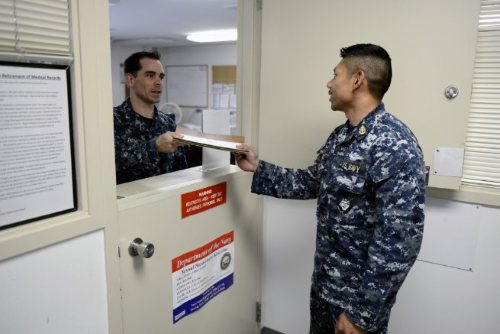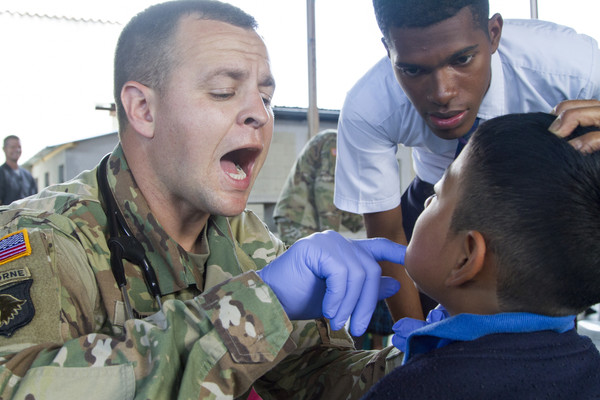The U.S. Armed Forces employ several guidelines to make sure recruits are eligible for service.
It’s why the military has educational, citizenship, and physical fitness requirements.
Additionally, new recruits must pass a medical and dental exam, as well as an observation of their mental health.
However, if the military deems you medically unfit for service, you may have a chance of receiving a military medical waiver.
Here is your guide to military medical waivers and what you need to know.
Related Article: 41 Questions To Ask A Military Recruiter
Table of Contents
Department of Defense Medical Requirements
The Department of Defense (DoD) sets medical requirements for military service. This policy is set out in DoD Instructions 6130.03, Volumes 1 and 2, and they apply to all branches of the US military.
Volume 1 involves “accession standards,” which are guidelines for new enlistees and newly appointed officers.
The DoD frequently updates these policies according to new information about medical conditions as well as recruiting and retention needs.
The primary goals of Volume 1 are to:
- Ensure recruits are free of communicable diseases.
- Verify that current medical conditions won’t require time lost from duty.
- Establish that new recruits are able to complete their training and service contracts.
- Ensure recruits can perform their military duties without making any existing medical conditions worse.
The list of disqualifying medical conditions is long and can prove confusing. However, keep the purpose of the policy in mind as guidance if you’re wondering if you can get a waiver for your medical condition.
This list of conditions applies to new recruits and officers who wish to enter the military. Current service members are directed to Volume 2 of the publication.
A simplified summary of disqualifying medical conditions for enlistment includes:
- Deformities that prevent the wear of protective masks and headgear.
- Chronic or degenerative eye diseases that impair eyesight.
- Diseases or conditions of the ears that impair balance.
- Hearing loss or vision loss at specified thresholds.
- Recent or recurrent history of lung infections, such as pneumonia or tuberculosis.
- History of serious heart disease or defects that require surgical repair.
- Recent history of moderate or severe heart disease.
- Recent or recurrent gastrointestinal diseases and conditions such as gastric or duodenal ulcers, colitis, malabsorption syndromes, irritable bowel syndrome, or diverticular disease.
- History of chronic or degenerative liver disease, such as cirrhosis
The list involves every part of the human anatomy. You’ll notice that most of them can be too debilitating for rigorous military service. They can also prove expensive or complicated to treat.
Important Take-Aways
Note that many medical conditions on the list are only disqualifying until successfully treated. For example, having braces on your teeth will disqualify you, but only until they are removed.
Even some of the more serious medical conditions won’t disqualify you if they’ve been treated and your health restored for a set period of time.
Other conditions are based on how badly they affect your ability to serve without needing specialized medical care.
Waiverable Conditions Per DoD
If you’re reading about military medical waivers, then you’ll be glad to know that part of the DoD policy is to “allow applicants who do not meet the physical and medical standard” to be considered for a waiver.
While the DoD sets the medical standards, each branch manages its own waiver policy and process.
The DoD defines a waiver as:
“A formal request to consider the suitability for service of an applicant who, because of current or past medical conditions, does not meet medical standards. Upon the completion of a thorough review, the applicant may be considered for a waiver.”
So, if you’re worried that your health may affect your ability to enlist, know that it depends on the extent of your condition and the branch you’re considering.
Each branch has its own waiver policy, and these change according to recruiting needs. Branches that haven’t met their goals for new enlistments may be more generous with waivers.
Lawmakers are insisting that all branches reconsider their standards as we learn more about the importance of treating mental health conditions instead of stigmatizing them.
In fact, the Pentagon is currently evaluating a list of previously disqualifying conditions to see if they should require a waiver at all.
Navy Medical Waiver Process

When enlisting in the Navy, your recruiter will have you fill out an Accessions Prescreen Medical History Report.
The prescreen application is provided by a Navy recruiter to check for any conditions that might make you unfit for service.
It’s tremendously important not to lie on your medical prescreening or during your time at MEPS.
Before shipping out to boot camp, you’ll receive a medical exam at the Military Entrance Processing Station (MEPS).
Several health conditions make military service difficult yet not impossible. In many cases, you could qualify for a medical waiver.
Navy Waiverable Medical Conditions

Here are some of the medical conditions for which recruits normally receive a waiver in order to enlist in the U.S. Navy.
- LASEK and PRK eye surgery
- Asthma, depending on length of time since symptomatic
- Orthopedic injury or surgery
- Repaired congenital cardiovascular disorders
- History of gynecological disorders
- Gastrointestinal disorders
- Mild scoliosis, back pain
- History of childhood epilepsy or concussion
- History of urinary disorders, like kidney stones
- Some mood, personality, or behavior disorders
- Mild dermatological disorders
Related Article – Can You Join The Military With Scoliosis?
Navy Disqualifying Medical Conditions
Most new recruits will find it difficult to receive a waiver to enlist in the Navy with the following conditions:
- ADHD with prescribed medication
- Diabetes, Type I or II
- HIV/AIDS
- Loss of an eye, kidney, leg, or arm
- Crohn’s disease or Colitis
- Eating disorders
- Recent history of seizures
- Schizophrenia, Bipolar Disorder, or Panic Disorders
How to Get a Medical Waiver for the Navy
Before you can receive a medical waiver, you’ll first need to be permanently disqualified (PDQ) at MEPs. You may be disqualified after your prescreen is reviewed or during your medical exam.
If you have a medical condition that’s normally considered temporary, like an ear infection, you won’t be eligible for a waiver.
Navy Recruiting Command medical staff (CNRC N3M) will review your application to see if a waiver is possible. They may direct MEPs to conduct further interviews or have you consult with a specialist.
Once the required testing and consults are complete, your application will be reviewed again and N3M will forward any recommendation to the deciding authority.
In some cases, it can take a few weeks for results on your waver. In simplified cases, it can take as little as an hour.
Army Medical Waiver Process

The United States Army carries forward many of the same procedures at MEPS as the other military branches.
Some argue that the Army is less selective because it has the highest enrollment of all military branches.
Therefore, the possibility of receiving a medical waiver might improve with the odds. But at the end of the day, it still comes down to your medical condition.
There are some conditions the Army is willing to accommodate.
In every case where a medical waiver is not approved, it generally is because the condition could serve as a safety or liability hazard for you or your fellow soldiers.
The Army isn’t as cut and dried with its waiver policy as the Navy, and medical waivers are often considered on a case-by-case basis.
Army Waiverable Medical Conditions
Army policies involving waivers for several mental health issues have recently been employed in order to allow more recruits to enlist. Like the Navy, the possibility of getting a waiver increases when symptoms are mild and not likely to impact your performance.
The Army is now willing to consider issuing enlistment waivers for:
- Mood disorders
- Personality disorder
- Disorders with psychotic features
- Drug or alcohol abuse or dependence
- Drug overdose
- Suicide attempt, gesture, or ideation
For other medical conditions laid out by the DoD’s disqualification list, a request must be submitted through appropriate channels.
The majority of waivers requested for Army enlistment involve issues with eyes and eyesight. Of these, the Army normally approves about 58% of these requests.
Related Article – Military Dental Requirements and Disqualifications
Army Disqualifying Medical Conditions
One of the mental health conditions the Army will not waiver is a history of self-harm after the age of 14 or ADHD with medication.
Other conditions unlikely to be waived include:
- Obsessive Compulsive Disorder
- HIV/AIDS
- Diabetes, Type I or II
- Seizure disorders
- Significant hearing loss or loss of vision
- Cirrhosis
- Crohn’s Disease
- Heart Conditions or Defects
- Loss of an eye or limb
How to Get a Medical Waiver for the Army
The Army requires a potential recruit to have a current diagnosis or verified history of a condition outlined in the DoD Instruction to be disqualified for service.
Waivers for most medical conditions are handled on a case-by-case basis at the lowest level possible. They’re usually issued quickly if the condition isn’t active or doesn’t interfere with military service.
Waivers for mental health conditions are submitted to the Deputy Chief
of Staff, G-1 Director of Military Personnel Management (DMPM).
If you have a medical condition that concerns you, bring up the matter with your Army recruiter.
The recruiter is responsible for prescreening health concerns so he or she can inform you of the likelihood of receiving a medical waiver for the problem.
Related Article – Army Height and Weight Standards
Air Force Medical Waiver Process

After you complete the medical pre-screening for the United States Air Force (or any military branch) you progress to MEPS.
Keep in mind that MEPS does not belong to any particular branch, but rather to the Department of Defense.
As stated earlier, the disqualifying medical conditions for one branch are the same for another branch. Doctors employed by the DOD will contact new recruits if anything comes up on the prescreening that requires a closer examination.
As in other branches, the Air Force will waive some conditions if they won’t impact your ability to perform your duties.
There, it’s possible to request a medical waiver with the Air Force.
Air Force Waiverable Medical Conditions
Recent changes to Air Force enlistment standards have streamlined the process for receiving waivers.
Potential Ajrman can now expect to receive a medical waiver for:
- Eczema, if mild
- ADHD / non-medicated 15+ months
- Asthma with Methacholine Challenge Test
The United States Air Force is considered slightly more selective than some of the other military branches.
There is currently no set list of waivable medical conditions for the Air Force. The most common waivers that potential Airmen applied for involved conditions of the eyes and eyesight, muscular skeletal disorders, and learning, behavioral, or psychiatric disorders.
That said, the primary authority for Air Force medical waivers noted that they perform “occupational suitability assessments” before granting waivers. So, your ASVAB scores and prior education may likely affect your ability to receive one.
If your ASVAB scores qualify you for a much-needed AFSC, it’s likely you’ll receive a waiver for any condition that doesn’t impact your ability to perform in that career field.
Also, it’s worth noting that approximately 61% of medical waivers for Air Force enlistment are approved.
Air Force Disqualifying Medical Conditions
Medical conditions unlikely to be waived by USAF medical authorities are similar to those for the Navy and Army. They include:
- AIDS/HIV
- Cirrhosis
- Crohn’s disease
- Diabetes (Type I or Type II)
- Uncorrected heart conditions or birth defects
- Loss of an eye or limb
- Loss of vision or hearing below certain thresholds
How to Get a Medical Waiver for the Air Force or Space Force
The authority to approve any medical waiver for both the Air Force and Space Force enlistment lies with the Air Force Recruiting Service and is processed through its Chief Medical Officer (CMO).
When potential Air Force Airmen or Space Force Guardians are medically disqualified at MEPs, the Accession Medical Waiver Division reviews each case.
They weigh the risks to the individual Airman and the mission impact against their medical history to reach a decision.
Related Article – Military Disqualifications For Mental Health: 9 Common Conditions
Marine Corps Medical Waiver Process

The Marine Corps is the most selective military branch with highly demanding basic training.
Regardless, that doesn’t mean that a medical condition will disqualify you from the Marine Corps.
In fact, they may be the easiest and quickest to have approved.
The medical doctor assigned to you at MEPS has the ability to indicate on your records if a waiver is recommended for your case.
The doctor must consider questions like:
- Is the medical condition progressive?
- Can the condition get worse because of military service?
- Can the recruit complete satisfactory training for military duty with the condition?
- Does the condition create an undue hazard to the recruit or other service members in combat situations?
Once a doctor at MEPS makes a recommendation, the decision is left up to the Marine Corps to approve the waiver or not.
Marine Corps Disqualifying Medical Conditions
The Marine Corps is a demanding and intense branch of the military to join.
Like other branches, the following conditions are not likely to be waived.
- AIDS/HIV
- Significant hearing or vision loss
- Severe dental disorders
- Uncorrected heart conditions or defects
- Diabetes (Type I or Type II)
- Endocrine disorders
- Spine and Joint conditions
- Loss of eye or limb
How to Get a Medical Waiver for the Marine Corps
For future enlisted Marines processing through MEPs, the doctor providing your medical exam may find a condition or flag something in your medical records.
If it’s a medical condition outlined as disqualifying by the DoD, you’ll need a medical waiver to continue enlistment. The waiver will be assessed by the Navy’s Bureau of Medicine and Surgery (BUMED), where a doctor will review the request. It may be granted immediately. They may require further testing or documentation.
Most medical waivers requested for the Marine Corps involved conditions of the eyes or eyesight and learning, behavioral, or psychiatric disorders.
That said, the Marines have a 73% medical waiver approval rate.
Related Article: Can You Join The Military With Asthma?
Coast Guard Medical Waiver Process

Similar to the conventional military branches, the Coast Guard requires a pre-screening survey and a physical exam for future personnel.
Even though the Coast Guard is only under the auspices of the DoD during wartime, they base their medical standards on the same Instructions.
The Coast Guard offers a more streamlined waiver process than other military services. Your recruiter can even file a waiver request if he or she thinks you have been erroneously disqualified.
So, the best thing you can do is be open and honest with your recruiter about any underlying medical conditions.
Coast Guard Waiverable Medical Conditions
The Coast Guard doesn’t publish statistics on waivered medical conditions. However, they do ask that potential recruits make sure to provide documentation for the following medical conditions:
- Cardiovascular conditions
- Seizure disorders
- Psychiatric disorders
- Sleep Disorders
- Any chronic use of impairing medications
It’s a reasonable assumption that offering a complete history of these conditions may infer that the condition can be waived.
Coast Guard Disqualifying Medical Conditions
The U.S. Coast Guard follows the same guidelines as the other military branches.
Conditions the Coast Guard may not waive include:
- AIDS/HIV
- Autism
- Crohn’s disease
- Diabetes (Type I or Type II)
- Uncorrected heart conditions or defects
The following disorders are generally automatic disqualifiers in the Coast Guard:
- Severe anxiety disorders
- Bipolar disorder
- Drug/Alcohol Addiction
- PTSD
- Schizophrenia
However, the Coast Guard (like other branches) is starting to apply more waivers to anxiety and depression than in the past.
Regardless, it’s still very difficult to receive a waiver for more serious mental health problems.
How to Get a Medical Waiver for the Coast Guard
After providing your medical pre-screen survey to your recruiter, you’ll receive a full physical examination at MEPs. Your physician will note any problems they find.
If the examiner feels that a disqualifying medical condition won’t prevent you from performing Coast Guard duties, they may recommend a temporary or permanent waiver in your records.
These documents are then reviewed by trained medical technicians, and files for any flagged conditions are elevated for higher review. A licensed Physician’s Assistant (PA) will then review these on a case-by-case basis.
PAs can grant waivers at that level, although they may request additional information. If they don’t feel a waiver is feasible, then an Occupational Medicine Physician (MD) will review the applicant’s medical records.
The Coast Guard permits waivers at any level of this process, which makes it more efficient. The Coast Guard policy is to waive any medical condition that doesn’t “pose a significant risk to maritime safety.”
Note that while they acknowledge your medical condition, you’ll be responsible for notifying your chain of command of any significant changes in that condition.
Practical Evaluation of Physical Ability
While other branches may not accept recruits who have lost an eye or a limb, the Coast Guard may offer a “Practical Evaluation of Physical Ability.”
This assessment may be tasked for any condition or disability that may hamper your ability to perform duties on a Coast Guard vessel.
You’ll have the opportunity to prove that, despite your medical condition, you can still:
- Operate fire-fighting equipment
- Hear and see warning signs and instructions
- Participate in any emergency ship evacuation
Related Article – Can You Join The Military With Autism?
Frequently Asked Questions (FAQ)

Here are some frequently asked questions about military medical waivers.
It helps answer some of the basics about medical waivers.
Speak to a local military recruiter for more questions about disqualifying health conditions.
How long does a military medical waiver take to get approved?
It’s difficult to set an accurate timeframe for military medical waivers.
There are several factors to take into account, and much of the timeframe depends on the type of medical condition and the severity of the issue.
The speed of obtaining a military medical waiver may depend on the branch of service, all of which have their own processes.
Often, a military medical waiver needs to pass varying levels of approval before you are granted permission to enlist.
In general, expect at least two weeks to a month to hear back on a military medical waiver.
Related Article – 20 Health Conditions That May Disqualify You From Military
What’s the difference between Temporary vs. Permanent Disqualifications?
A temporary disqualification is something that temporarily prevents you from serving.
For example, breaking a foot inhibits you from carrying out the functions for duty.
However, a broken foot will heal and with time, the problem is no longer existent.
Those with a temporary disqualification do not need to apply for a waiver.
They simply need to wait and let time heal the problem.
On the other hand, a permanent disqualification is something that will not go away with time.
The health condition is sometimes correctly through surgery or with medication.
Regardless, you need a military medical waiver to receive permission to enlist.
If I’ve previously been disqualified from MEPS, can I try again?
You cannot enlist with a permanent medical disqualification without an approved waiver.
The first step in a military medical waiver process is receiving a recommendation from a doctor at MEPS.
If the doctor recommends you for a waiver, then you still have a shot at receiving approval.
However, there is no opportunity for an appeal if the doctor fails to recommend you at MEPS.
Once a doctor at MEPS makes the recommendation it’s passed to a recruiting commander for the military branch you are seeking to join.
Each military branch handles medical waiver reviews differently but usually goes through several layers of approval.
It’s possible to have a second opportunity at MEPS though it depends on the health condition.
Related Article – How To Join The US Army
If I’ve been disqualified from one branch of the military, can I join another branch?
The Armed Forces use the same disqualifying medical conditions for every military branch.
Therefore, what is disqualifying in the Army is also disqualifying in the Navy.
However, one branch may approve a waiver while another branch may not, based on the condition, your role in the military, and other factors.
It’s possible to try to enlist in another branch after another denied your military medical waiver.
Once again, it primarily depends on the health condition.
For example, someone with Schizophrenia is likely to get denied by every military branch, while another recruit with a small curvature of scoliosis might have better luck the second time around.
If I’ve been disqualified from the military, can I contact my congressperson?
The answer is no based on the current Department of Defense regulations.
Each military branch has the right to approve or deny medical waivers, depending on the current needs of the service.
As a result, contacting a congressperson will not change anything about the matter.
What if I get a disqualifying medical problem after I enlist?
Any medical condition that is diagnosed after you become active-duty is treated differently compared to new recruits.
As long as the condition is not pre-existing (meaning that you were aware of the condition and intentionally lied on the original enlistment papers), your medical case is handled differently.
In most cases, the default position of most branches is to ensure you get adequate treatment for your condition.
Consequently, it’s difficult to get discharged from the military unless a Medical Evaluation Board believes differently.
For more information about disqualifying medical conditions for members currently serving in the military, reference DoD Instructions 6130.03, Volume 2.
Related Article – How To Lose Weight For The Military: Your 30-Day Plan
Conclusion
A military medical waiver is an opportunity to receive special permission to join the military with a disqualifying health condition.
There are a variety of health conditions that are disqualifying in the military.
All the military branches follow the same guidelines set forth by the Department of Defense for disqualifying health conditions.
However, the final determination on a military medical waiver depends on the specific branch with some being more selective than others.
It also depends on whether the health concern is a temporary or permanent health disqualification.
The DoD’s position is that you be permitted a waiver as long as your medical condition doesn’t endanger yourself or your fellow servicemembers.
Speak to a local military recruiter for more information about disqualifying health problems, seeking a medical waiver, and MEPS.
- Navy Promotion Timeline for Enlisted & Officers - June 19, 2024
- Navy SEAL Training (BUD/S) - June 19, 2024
- Navy Aircraft Carrier Flight Deck Shirt Colors Explained - June 19, 2024
Originally posted on March 31, 2020 @ 4:50 pm
Affiliate Disclosure: This post may contain affiliate links. If you click and purchase, I may receive a small commission at no extra cost to you. I only recommend products I have personally vetted. Learn more.

